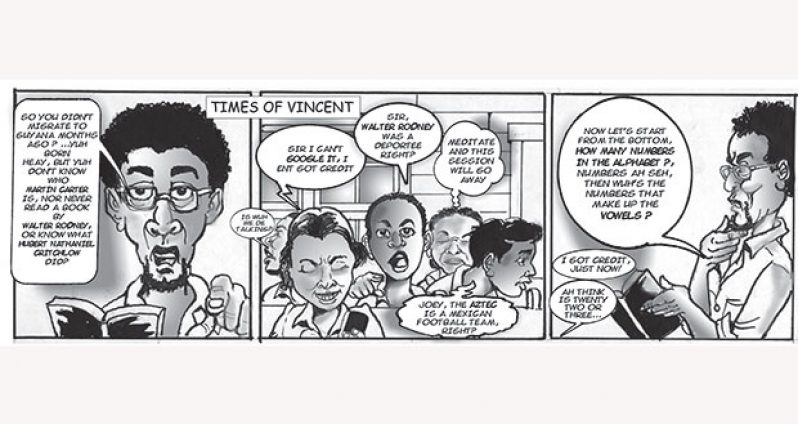A WEEK ago, I was asked to have a discussion on Walter Rodney at a private school. I discussed the direction I would take with the school’s head, because I didn’t want to indulge in the preamble reflective of the political banter concerning this citizen’s death. I would walk with some of his books and create the interactive discussion on Dr. Rodney’s works, which, to me, has been abandoned for the self-serving power politics of perception that has, for decades, wrapped itself around the Guyanese consciousness.
The purpose of the exercise was to help expand the social awareness of young Guyanese with respect to our heroes. I was dealing with Form IV.
I will now share that experience with you; I have had the disappointing nod of approval from the school’s head. I began the hour’s discourse by asking any student to say what they knew of Dr Rodney. No response.
This I credited to the chill students have when challenged to “break the ice” as the first on the invisible podium; we have all been there at some time.
I proceeded to do a synopsis on ‘How Europe Undeveloped Africa’, dissecting the subject into the periods of “Slavery” and “Colonisation”.
I had a flashback to a lecture event the Pan-African Movement had some weeks ago, where the lamentation was that such events seem only to attract persons above 40. And I immediately captured the recent Broadway presentation by Lin Miranda on the American national hero, Alexander Hamilton.
Miranda used the ‘Rap’ idiom to tell that story, and it won him 16 nominations and 11 Tony Awards.
THE SWITCH
Because I wasn’t getting through, I switched to the one book that I assumed would ignite some interest: ‘A History of the Guyanese Working People, 1881-1905’. I brought the facts of working 14 hours a day without overtime on the estates and the waterfront, without elevation of status and options that were now normal to this current time; housing was definitely different. I inserted the name of Martin Carter and his verse, ‘I come from the nigger yard of yesterday’ and how Hubert Nathaniel Critchlow formed the British Guiana Labour Union (BGLU) for better living standards. It was evident that there was a great divide.
When I challenged the class to tell me who Martin Carter was, no one responded.
I enquired if they knew how long South Ruimveldt and its sister schemes existed. No one could say.
This was a descent into a surreal pedestrian realm, not entirely of these children’s making. Activities from the school system, parents and the conversations in the home, content on television shaping priorities all are contributing factors to this loss of awareness.
I shifted to Walter Rodney as a Guyanese; I needed to delve into their sub-consciousness. Surely they could not have not heard something about this prominent citizen, and his contributions; it’s just impossible, I concluded.
THE GYAFF
By that time, I had coaxed an active, interactive relationship of “gyaff”, so some questions came forward.
“Was Rodney a deportee? He did get deport from somewhere, right?”
“Rodney used to kill people for the government, right?”
“How he died?”
By this time, the class was divided; an almost all-male group had gathered in the first two benches right before me. This was inspiring, though the rest of the class, from the blank, unresponsive stares, had diverted into group conversations, and playing with their phones.
I had about 12 to 14 Fourth Formers who were asking significant questions. Two young men in particular were interested in the whereabouts of the main actors said to be involved in Dr Rodney’s death.
I related that they were all dead. “Then, why was there an inquiry?” I had to explain that Politicians deal with perspectives, and not necessarily the truth.
The final question of that session was: “Do the people involved in inquiries work for free?” I responded in the affirmative, and they asked, “How much?”
I indicated that I did not know the exact amount. “Over three hundred million dollars,” I said. They were astounded.
One youth who had remained quiet, but attentive, burst out, “What! And sports can’t get a plane ticket! What!”
THE BREAKTHROUGH
I used that as the cue to implore that they pay attention to what’s happening around them: Read the newspapers, and watch the news on TV at times.
I had them write down the names of Dr, Rodney’s books, and urged them to credit his most significant contributions to the world and to his country; his academic contributions.
Fixing the education of the next generation will take unorthodox methods. There should be a History and Guyana month every May, when topics of significant, holistic moulding can be dealt with.
If, as a result of such a programme, 10% of our young do self-driven further reading into charted subjects, the fact is that a ‘History and Guyana Month’ can be an awakening experience for not only students, but for all directly and indirectly related.
This article was written with permission from the Head of the school involved.



.jpg)








